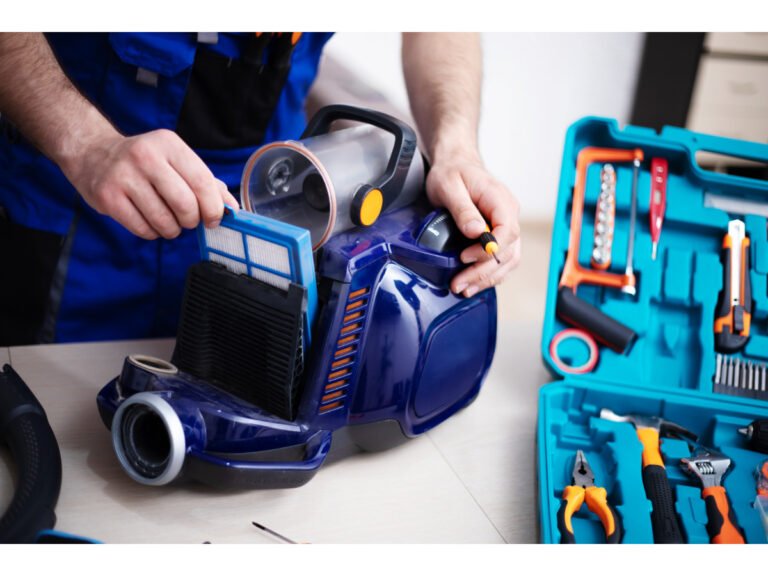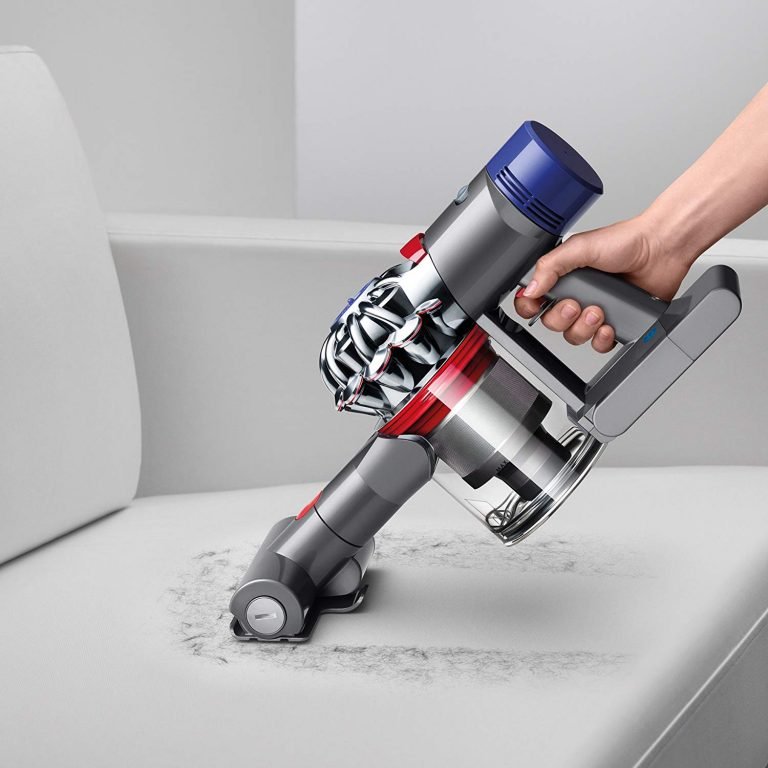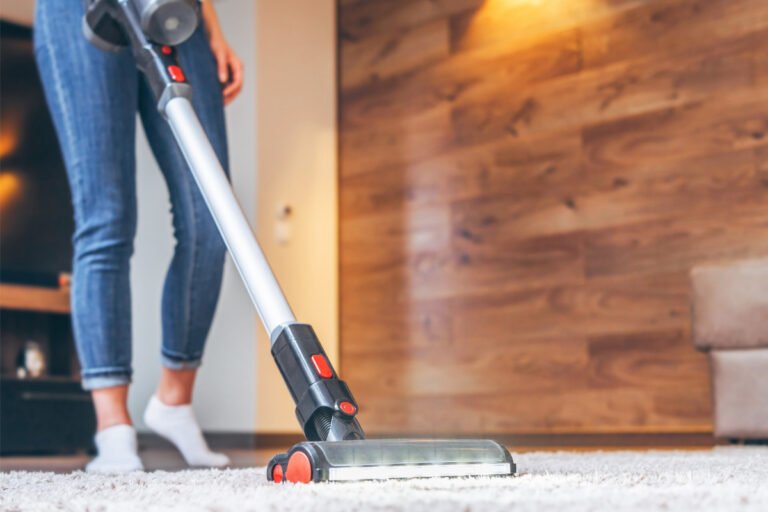Why Does My Vacuum Cleaner Keep Cutting Out?
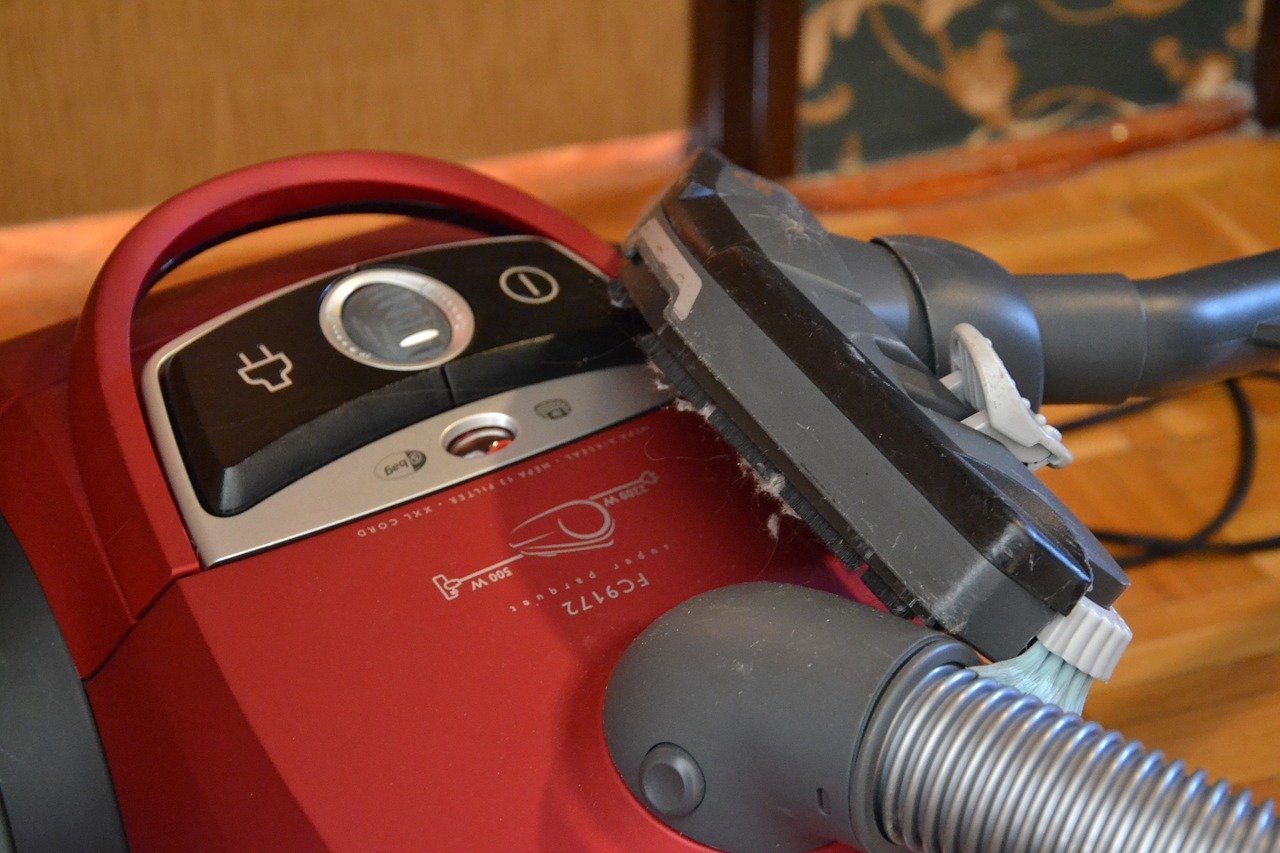
Have you experienced a vacuum cleaner keep cutting out? Imagine your vacuum machine breaking down during a cleaning spree. These are regular issues for vacuum machine users, and they may be annoying, especially while cleaning. Vacuum takes a rest.
Problem-solving begins with understanding why this happens. Like other home appliances, vacuum cleaners have limitations and eccentricities. They may be removed for many reasons. Motor issues caused by dust or aging may also cause it.
Don’t worry—we’ll assist you understand this confusing situation. This post will explain the most common reasons your vacuum cleaner may be cutting out and offer practical strategies to fix it. So when your vacuum takes an unexpected break, you’ll know what to do!
Understanding Vacuum Cleaners

Vacuum cleaners are truly remarkable inventions that have revolutionized how we clean our homes. These machines are designed to create a vacuum (hence the name) that sucks up dirt and dust from our floors, carpets, and other surfaces. But how exactly does a vacuum cleaner work? Let’s delve into the basic workings of this ingenious device.
Basic Workings of a Vacuum Cleaner
At its core, a vacuum cleaner works on the principle of creating a difference in air pressure. When you switch on your vacuum cleaner, the electric motor starts spinning. This motor is connected to a fan, rotating at high speed. As the fan blades turn, they force air towards the exhaust port.
This action creates a partial vacuum inside the cleaner. The high-pressure air outside the vacuum cleaner wants to rush in to fill this space, and in doing so, it carries along any loose dirt or dust particles from your carpet or floor. This dirt-filled air then passes through a filter or bag that traps the dirt, allowing only the clean air to escape into the room.
For example, consider how you might drink a beverage using a straw. When you suck the air out of the straw, you create a vacuum, and the liquid rushes up to fill that vacuum. A vacuum cleaner operates on a similar principle, but instead of liquid, it’s picking up dirt and dust!
Common Types of Vacuum Cleaners and Their Unique Features

Now that we understand the basic principle behind a vacuum cleaner, let’s explore some of the common types of vacuum cleaners and their unique features.
→Upright Vacuum Cleaners:
These are probably the most recognized types of vacuum cleaners. They stand upright and are typically designed with a rotating brush to dislodge dirt and debris. Upright vacuum cleaners are particularly effective on carpets and come with various attachments for tasks like dusting furniture or vacuuming stairs.
→Canister Vacuum Cleaners:
Canister vacuums are versatile and powerful. They consist of a canister that houses the motor and dust collection system, connected to a wand via a long vacuum hose. These vacuums are great for cleaning under furniture, vacuuming stairs, or tackling curtains and upholstery.
→Stick Vacuum Cleaners:
Lightweight and easy to maneuver, stick vacuums are perfect for quick clean-ups and smaller homes. They’re similar in design to upright models but are much lighter and often cordless. Some models can even transform into handheld vacuums for maximum versatility.
→Robot Vacuum Cleaners:
The future is here! Robot vacuums work for you, navigating around your home to clean your floors. They’re equipped with sensors to avoid obstacles and can return to their docking station to recharge when their battery is low.
→Handheld Vacuum Cleaners:
Portable and compact, handheld vacuums are perfect for small tasks like cleaning your car interior or picking up crumbs from a couch.
→Central Vacuum Systems:
It is installed in homes during construction, these systems have outlets in different rooms where you can attach a hose and cleaning head. The dirt and debris are carried through hidden pipes to a central collection point, typically in a garage or basement.
Each type of vacuum cleaner has unique features designed to cater to specific cleaning needs. Understanding these differences can help you choose the right vacuum cleaner for your home and ensure you get the most out of this essential cleaning tool.
Why Does My Vacuum Cleaner Keep Cutting Out?
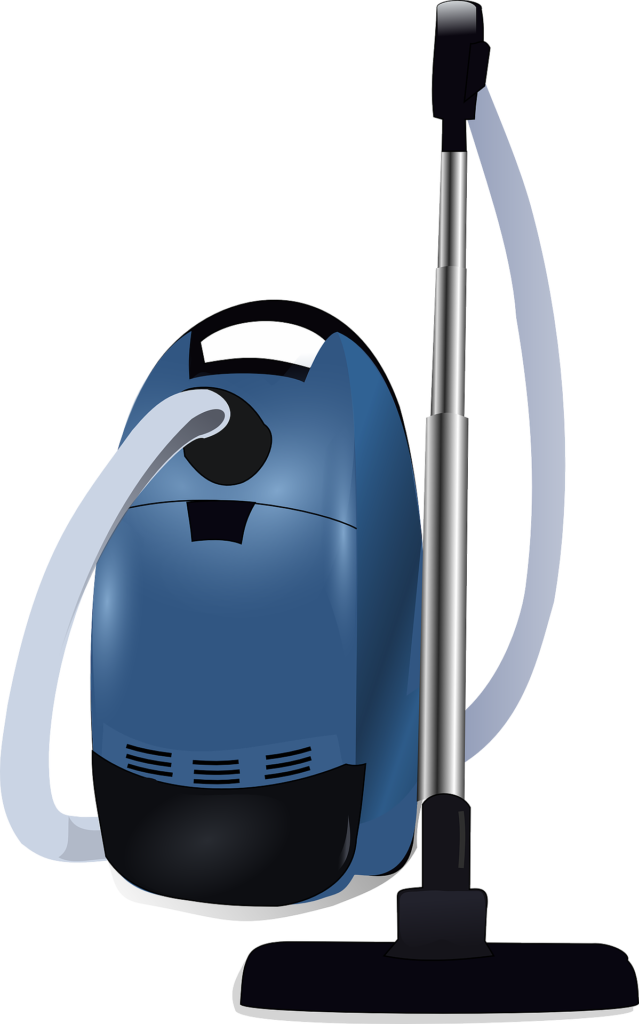
So, why does your vacuum cleaner keep cutting out? There could be several reasons, including overheating, electrical, motor, or battery-related issues if it’s a cordless vacuum. Let’s break these down to better understand what’s happening.
❗Overheating Due to Clogged Filters or Bags
One of the most common reasons for your vacuum cleaner cutting out is overheating, usually caused by clogged filters or bags. When the bag or filter in your vacuum cleaner becomes full or clogged with dirt and dust, it restricts airflow. It causes the motor to work harder, generating more heat than usual. If this heat builds up without being adequately dissipated, it can cause the vacuum cleaner to overheat and automatically shut off as a safety measure.
For instance, if you’re vacuuming a particularly dusty area and forget to empty the bag or clean the filter, you may find your vacuum cleaner suddenly shutting off. The solution here is straightforward: regularly check and clean your vacuum cleaner’s filters and bags to ensure optimal airflow and prevent overheating.
❗Electrical Issues Such as Faulty Wiring or Worn-Out Switches
Electrical issues are another common culprit when your vacuum cleaner keeps cutting out. These could range from problems with the power cord, worn-out switches, or faulty wiring within the vacuum. For example, if the power cord is damaged, the vacuum might not get a consistent electricity supply, causing it to cut out randomly. Similarly, a worn-out switch could lead to intermittent power loss.
If you suspect an electrical issue, it’s crucial to address it promptly to avoid potential safety hazards. While some simple issues, like replacing a worn-out switch, can be a DIY task, a professional should handle more complex electrical problems.
❗Motor Problems Caused by Dust Accumulation or Age
The motor is the heart of your vacuum cleaner, and its issues can cause your vacuum to cut out. Over time, dust and debris can accumulate inside the motor, causing it to strain and overheat. Additionally, as your vacuum cleaner ages, the motor’s components can wear out, leading to inconsistent performance or sudden shutdowns.
Regular maintenance can help extend the life of the motor. However, if your vacuum cleaner is old and the motor keeps causing issues despite regular upkeep, it might be time to consider replacing it.
❗Battery-Related Issues for Cordless Vacacuums
If you’re using a cordless vacuum cleaner, battery issues could be why your vacuum keeps cutting out. These could range from a battery that doesn’t hold charge as well as used to problems with the charging system itself. For instance, the battery might be an issue if your vacuum cuts out after only a few minutes.
Regularly check your battery’s health and replace it when necessary. Also, ensure you’re charging your cordless vacuum properly and fully before each use for the best performance.
While it can be frustrating when your vacuum cleaner keeps cutting out, understanding the potential reasons can help you troubleshoot effectively and keep it in top shape for effective cleaning.
Signs Your Vacuum Cleaner May Be About to Cut Out
Just like other appliances, your vacuum cleaner might give you a few warning signs before it starts cutting out. Recognizing these signs can help you address the problem before it becomes a bigger issue. Let’s explore some common signs that your vacuum cleaner may be about to cut out.
◾️Unexpected Power Loss During Operation
One of the most obvious signs is an unexpected power loss during operation. If your vacuum cleaner suddenly shuts off while you’re using it, it could indicate something is wrong. As we discussed earlier, this could be due to overheating, electrical, or even motor problems.
For example, if you’re in the middle of vacuuming and your vacuum suddenly loses power, it might be an overheating issue. In this case, check for clogged filters or bags, give your vacuum some time to cool down, and then try using it again.
◾️Unusual Noises or Smells
Another sign that your vacuum cleaner may be about to cut out is if it starts making unusual noises or emitting strange smells. These could indicate various issues, from a clogged brush making a screeching sound to a burnt smell indicating a potential motor problem.
If your vacuum cleaner starts sounding like a jet engine or gives off a burning smell, it’s time to investigate. Unplug your vacuum cleaner immediately to avoid any potential safety hazards, and then check for any visible issues like clogged brushes or filters. If the noise or smell persists, it might be best to consult a professional.
◾️Reduced Suction Power
Reduced suction power is another telltale sign that your vacuum cleaner may be about to cut out. It could be a sign of a clogged filter or bag, a blocked airway, or even a motor issue.
For instance, if you’re vacuuming your carpet and notice that it could be cleaner after vacuuming, check the bag or filter. A simple cleaning or replacement might solve the problem. If the suction power doesn’t improve, it might indicate a more serious issue, like a motor problem.
By staying alert to these signs, you can tackle potential issues with your vacuum cleaner head-on, preventing it from cutting out unexpectedly and ensuring that you maintain an effective cleaning routine.
How to Prevent Your Vacuum Cleaner from Cutting Out

A vacuum cleaner, like any other appliance, can serve you well for many years if you take good care of it. So, how can you prevent your vacuum cleaner from cutting out? The answer lies in regular maintenance and cleaning, timely replacement of worn-out parts, and proper usage to avoid unnecessary strain on the machine. Let’s dig deeper into each of these preventative measures.
✔️Regular Maintenance and Cleaning
Regular maintenance and cleaning are key to ensuring the longevity of your vacuum cleaner. This involves emptying the bag or dust container before it gets too full, cleaning or replacing the filters as the manufacturer recommends, and checking for and removing any blockages in the airways or brush.
For instance, if you have a bagged vacuum cleaner, try not to wait until the bag bursts at the seams before replacing it. An overfilled bag can restrict airflow, causing the motor to work harder and possibly overheat. Similarly, a quick check of the brush after each use can help you spot and remove any tangled hair or threads that could cause it to jam.
✔️Replacing Parts When Necessary
Over time, certain parts of your vacuum cleaner will wear out and must be replaced. It could include the bag or filters, the belt that drives the brush, or even the battery in a cordless vacuum cleaner. Timely replacing these parts can help prevent your vacuum cleaner from cutting out unexpectedly.
For example, if your vacuum cleaner’s suction power has reduced, it might be time to replace the filter. Or if the brush isn’t rotating as efficiently as it should, check the belt – it might be worn out or broken and need replacing.
✔️Using the Vacuum Cleaner Properly to Avoid Unnecessary Strain
Finally, using your vacuum cleaner properly can go a long way toward preventing it from cutting out. It involves not using it to pick up large or sharp objects that could block the airways or damage the internal components, not overworking it by trying to clean an excessively dirty area all at once, and not pulling it around roughly by the power cord.
For example, if you’ve had a major spill of cereal on your kitchen floor, don’t try to vacuum it all at once. Instead, pick up the larger pieces manually before using the vacuum cleaner to handle the smaller particles. This can help prevent clogging and unnecessary strain on the motor.
By following these preventative measures, you can help ensure that your vacuum cleaner continues to operate efficiently for many years, keeping your home clean and dust-free.
What to Do When Your Vacuum Cleaner Cuts Out
Regardless of how well you maintain your vacuum cleaner, it may occasionally thermal cut due to unforeseen issues. But don’t worry; there are steps you can take to address this issue, ranging from basic troubleshooting to seeking professional help. Also, understanding the cost considerations for repair versus replacement can help you make an informed decision. Let’s delve into these points in more detail.
📌Basic Troubleshooting Steps
If your vacuum cleaner cuts out, the first thing to do is do some basic troubleshooting. Start by checking for any obvious problems. Is the power cord plugged in securely? Is the bag or dust container full? Are the filters clogged? Is there a blockage in the airways or the brush ?
For example, if your vacuum cleaner suddenly loses power, check the power cord and the outlet. Try plugging another appliance into the same outlet to see if it’s an issue with the power supply. If your vacuum cleaner isn’t picking up dirt effectively, check the bag or dust container and the filters. A quick cleaning or replacement might solve the problem.
📌When to Call for Professional Help
While basic troubleshooting can resolve many common issues, there might be times when you need to call for professional help. It could be when you suspect an electrical issue, a motor problem, or any other issue that’s beyond your expertise to fix.
For instance, if your vacuum cleaner emits a burning smell, it could indicate a motor problem. In such cases, it’s best not to attempt a DIY fix as it could lead to further damage or a safety hazard. Instead, contact a professional repair service to diagnose and fix the problem.
📌Cost Considerations for Repair vs. Replacement
Finally, when your vacuum cleaner cuts out, one important factor to consider is the cost of repair versus replacement. If your vacuum cleaner is relatively new and the repair cost is reasonable, it might be worth fixing it. On the other hand, if your vacuum cleaner is old and the cost of repair is close to or more than the cost of a new vacuum cleaner, it might be more economical to replace it.
For example, if the motor in your old vacuum cleaner fails, replacing the motor might be almost as much as buying a new one. In such cases, replacing the vacuum cleaner might be the more sensible option.
When your vacuum cleaner cuts out, don’t panic. Start with basic troubleshooting, call for professional help if needed, and consider the cost implications of repair versus replacement to make an informed decision.
Frequently Asked Questions
Can using the wrong type of extension cord affect my vacuum’s performance?
Yes, indeed. Using the wrong type of extension cord can significantly impact your vacuum cleaner’s performance. Extension cords with insufficient amperage can cause your vacuum cleaner to not receive enough power, leading to underperformance or damage. Always ensure you’re using an extension cord that matches your vacuum cleaner’s power requirements.
Are there any maintenance tasks I should regularly perform to prevent this issue?
Absolutely. Regular maintenance tasks can greatly reduce the chances of your vacuum cleaner cutting out. These tasks include emptying the bag or dust container before it gets too full, cleaning or replacing the filters as the manufacturer recommends, checking for blockages in the airways or brush roll, and replacing worn-out parts such as belts or batteries.
What should I check if my vacuum cleaner cuts out when using specific attachments?
If your vacuum cleaner cuts out when using specific attachments, it might be due to a blockage in the attachment itself or a compatibility issue. Check the attachment for any visible blockages, and ensure it’s properly connected. If the problem persists, consult your vacuum cleaner’s manual or contact the manufacturer to confirm the attachment is compatible with your model.
Are there any safety features that might cause the vacuum to shut off unexpectedly?
Yes, some vacuum cleaners have built-in safety features that could cause them to shut off unexpectedly. Overheating protection is one such feature; if the vacuum cleaner gets too hot, it will automatically shut off to prevent damage. Similarly, some models have automatic shut-off features if they detect a severe blockage. Always refer to your user manual for specific information about your model’s safety features.
When should I seek professional repair if my vacuum cleaner keeps cutting out?
As mentioned, If basic troubleshooting doesn’t resolve the issue, or if you suspect a more serious problem, such as an electrical issue or a motor failure, it’s time to seek professional repair. It’s also advisable to consult with a professional if your vacuum cleaner keeps cutting out repeatedly, even after performing regular maintenance tasks.
Final Words
Having your trusty vacuum cleaner cut out on you can be frustrating, especially in a cleaning spree. It’s as if an old friend has suddenly let you down. However, understanding the reasons behind this problem can empower you to take action. I’ve been through this situation myself, and it helps to know what to do when your vacuum cleaner cuts out.
Remember, regular maintenance and proper usage are key to ensuring your vacuum cleaner’s longevity and preventing those annoying cut-outs. But even if problems persist, don’t lose heart. Professional help is always available; sometimes, replacing an old vacuum cleaner might even open up a new world of improved features and efficiency. So, keep your home dust-free, and continue your cleaning journey with confidence and peace of mind.

